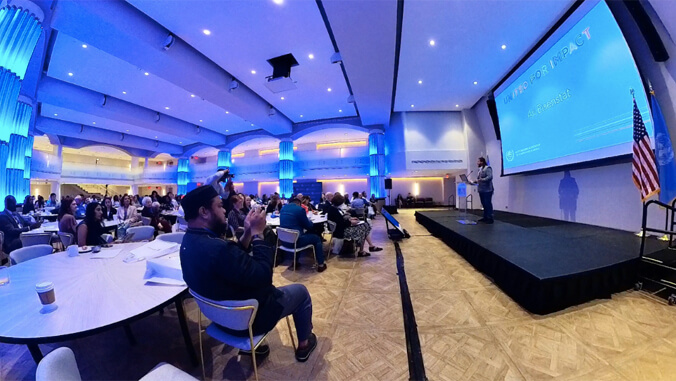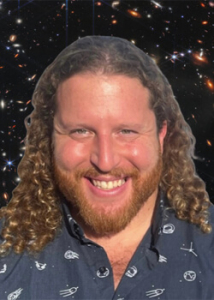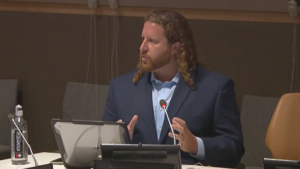
Ari Eisenstat has presented at the United Nations, judged a NASA aerospace competition and much more, all to make our planet a better place for future generations.
Eisenstat is a University of Hawaiʻi at Mānoa political science PhD student and instructor in the College of Social Sciences’ Hawaiʻi Research Center for Futures Studies. He also co-founded the UH Mānoa chapter of the United Nations Association (UNA), an organization that is committed to global engagement and advancing the United Nations’ mission and achieving its 17 Sustainable Development Goals.

Currently, the chapter has taken a futures studies approach in collaboration with local and national UNA-USA members, focused on the future of outer space policy for sustainable development, which is part of Eisenstat’s dissertation. In June 2023, he presented about the chapter’s work at the United Nations Association’s USA Leadership Summit in Washington, D.C.
“We wanted to showcase the amazing speakers that we’ve had in our UNA-USA Outer Space Innovation and Advocacy Series,” Eisenstat said. “We’ve had the UN director of outer space affairs, members of congress and NASA, as well as astronauts like Nicole Stott, and Moonwalker author Charlie Duke.”
He added, “Not only do we have the opportunity to share the work of these leaders and their vision for humanity in space, but we learn from the students who participate in these consultative sessions and express their hopes for the future.”
This past academic year, Eisenstat presented at the United Nations headquarters on emerging technologies that will help achieve its Sustainable Development Goals, judged the Conrad Challenge aerospace competition at NASA’s center in Houston, lectured at the New Worlds Conference at the University of Texas, and spoke at the Galactic Diversity and Inclusion Conference in Philadelphia.
Looking to the future

Futures studies looks at scenarios of possible futures to choose a preferred option.
“My preferred one is this transformational vision of the 2030 sustainable development agenda. I hope that we can achieve the Global Goals and then look toward the next 15-year agenda in becoming a multi-planetary civilization that honors human rights,” Eisenstat said. “My research is focused on democratizing, demilitarizing and decolonizing outer space.”
Eisenstat, who earned his bachelor’s degree in personal finance from the University of Wisconsin-Madison, has guest lectured at universities around the world, including Harvard University, Stanford University, Massachusetts Institute of Technology, University of Pennsylvania, Duke University and University of California at Berkeley. He chose to earn his PhD at UH Mānoa because it is one of the world’s most renowned institutions for futures research, consulting and education.
“It’s been really inspiring to have such a multidisciplinary approach to futures through my dissertation committee, and it’s been a privilege to take and teach classes across all types of departments within the university,” Eisenstat said.
Multidisciplinary approach
In addition to his academic work, Eisenstat is teaching POLS 342: Political Design and Futuristics, and PACE 420: Introduction to Human Rights: International and Comparative Perspectives at the Matsunaga Institute for Peace, which is housed in the College of Social Sciences’ School of Communication and Information. He has also lectured with the UH NASA astrobiology classes through the Institute for Astronomy, space exploration in Earth and planetary exploration technology and mechanical engineering, as well as the J-Term program at the William S. Richardson School of Law.
“It’s a testament to the political science department in allowing for this intersectional approach to exploring futures studies,” Eisenstat said. “It’s really given me the opportunity to explore all the different methodologies in creating sustainable futures. I try to take the social sciences and apply them to the space sciences, and also vice versa, take the space sciences and teach my human rights class what the future of human rights looks like in space.”
Eisenstat is a former leader in UH Mānoa’s Graduate Student Organization (GSO), serving as its sustainability chair, political science member and GSO representative to the UH Student Caucus. He is also the futures and digital media director at KTUH, UH Mānoa’s student-run radio station, and hosts “The Future Accords Podcast.”
“It’s been a great way of using social media beyond just FM radio to really engage and share the fantastic work that UH is doing,” Eisenstat said.

